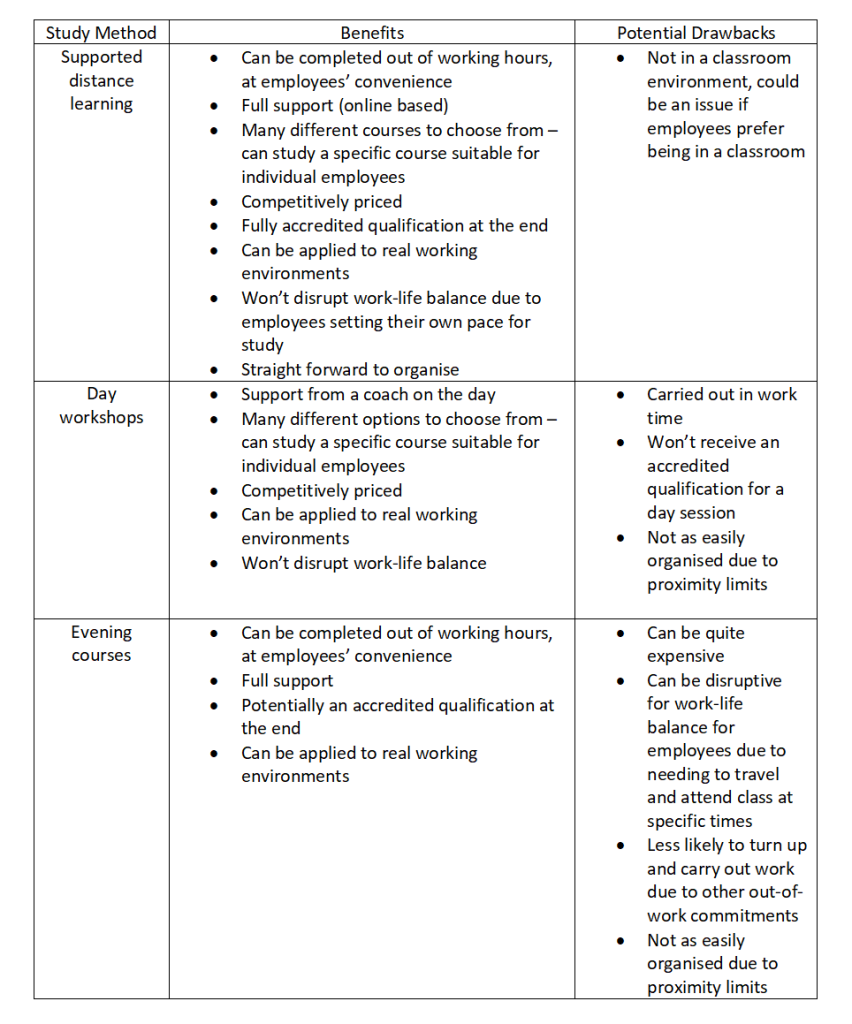Training, learning and development have become buzzwords in the world of employment that are often thrown around by HR professionals and managers. But, arguably, training your employees is an integral part to both their personal and professional development but also the progress and expansion of the business.
Why Training is Important
Creating a development plan which includes training for staff is becoming a regular occurrence for businesses. No longer are the days when your staff will turn up to work, do their job and go home. They want to be challenged and to develop, and have increased expectations to progress professionally with the help of their employer. For a business to be productive and ultimately successful, a lot of this depends on the happiness and retention of good workers. The more you increase your capacity for professional training and staff development, the better the chances for your business to be successful and grow.
The Benefits of Training Employees
There are many benefits to training your employees for both them and the company. These include:
Increased productivity
Training an employee results in a better quality of work which will lead to an increase in productivity. If every employee was supported with their development, this would result in a significant increase in productivity.
Promotion
Training employees adds value to their working experience, makes them better at their job and puts them in a position to be promoted and increase their responsibility and salary opportunities. It can be very beneficial to promote an internal employee to a new role over an external candidate, as they already know the business well and understand its values and standards. Remember, their success is not only a testament to their hard work but is something the company should take pride in, too.
Increased motivation
By investing in employees they feel acknowledged, rewarded, and an important part of the business. This will lead to the employee being motivated to do well and having more confidence to put themselves out there. This also creates loyalty to the business, ensuring the newly developed skills and knowledge will be utilised internally.
Workplace environment
Employees will be more content and motivated in their roles. This will lead to a more positive morale in the workplace, resulting in a much more enjoyable place to work.
Reduction in absenteeism
There will be less absenteeism as employees should be more engaged with their job and their role with a more exciting approach, which will also lead to increased productivity.
Employee retention
Employees will have higher job satisfaction and are less likely to look for new employment. This is great for the employee who doesn’t need to deal with the stresses of finding a new job. For the business, this results in far better retention and will significantly reduce recruitment requirements. A lot of businesses have large recruitment departments due to a high employee turnover. These resources can be saved by focusing more on supporting current employees. This also results in higher productivity (as knowledgeable employees stay within the business, and less time is needed to train new employees).
Business development
Employees will be better trained in their field, preparing them to adapt to business changes and growth. This results in the business being well equipped for the future, giving it an edge over competitors.
How to identify staff training needs
The identification of training needs should be done with great care, to ensure your investment meets the needs of both the employee and the organisation. The best way to do this is to carry out a training needs analysis (TNA).
A popular method for this is to conduct an analysis at the 3 levels of operation:
Organisational
This considers the overall training requirements for the business. To do this, a review of organisational strategy and goals should be carried out. An analysis of future skill needs is also required because businesses are constantly required to evolve in line with developing technology, product requirements and changes in political and economic circumstances.
Team
This level considers the training requirements for individual teams within an organisation. This level requires you to analyse the skills within a team and their overall objectives, to ensure they are in line with that of the organisation. By doing this, you will establish areas that need further skill development.
Individual
This level requires an analysis of training requirements for every employee. It’s important to ensure employee goals are in line with organisational objectives. For this, it’s beneficial to have one-to-one reviews to get an idea of where they are in terms of their goals and skills.
By conducting an analysis in this way, you will identify skill gaps from every angle, and get an understanding of what areas employees need to work on to ensure their development aligns with the organisation’s growth and development strategy. This will save time and financial resources that would usually be wasted on less relevant training courses that wouldn’t benefit employees as much or see a great return on investment.
Methods of training staff
There are many different methods of training that you could consider for your employees, some with great advantages over others. The three most popular options are; supported distance learning, daytime workshops and evening classes. Supported distance learning tends to be flexible so learners can study online at their own pace. Daytime workshops are carried out in person during working hours so employees learn while they earn. Evening classes tend to be at a set location for several weeks/months, where learners will attend a school-type classroom environment to study. Each study method has benefits and potential drawbacks, these are demonstrated below:

There are so many tangible benefits to training your employees, it would be counterproductive to the business to not put training plans in place. By understanding how to recognise skills gaps, and what training methods will be beneficial for who, you can put together individual training plans that will ultimately lead to a successful investment for the organisation.
Read to discover why training employees with DLC Training is the perfect choice, or to discuss your staff training requirements you can contact the business team on 0800 012 6770 or email businessteam@dlctraining.co.uk

